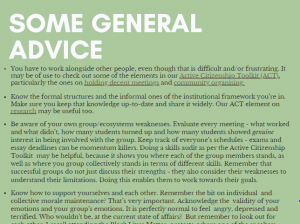
- You have to work alongside other people, even though that is difficult and/or frustrating. It may be of use to check out some of the elements in our Active Citizenship Toolkit (ACT), particularly the ones on holding decent meetings and community organising
- Know the formal structures and the informal ones of the institutional framework you’re in. Make sure you keep that knowledge up-to-date and share it widely. Our ACT element on research may be useful too.
- Be aware of your own group/ecosystems weaknesses. Evaluate every meeting – what worked and what didn’t, how many students turned up and how many students showed genuine interest in being involved with the group. Keep track of everyone’s schedules – exams and essay deadlines can be momentum killers. Doing a skills audit as per the Active Citizenship Toolkit may be helpful, because it shows you where each of the group members stands, as well as where you group collectively stands in terms of different skills. Remember that successful groups do not just discuss their strengths – they also consider their weaknesses to understand their limitations. Doing this enables them to work towards their goals.
– Know how to support yourselves and each other. Remember the bit on individual and collective morale maintenance? That’s very important. Acknowledge the validity of your emotions and your group’s emotions. It is perfectly normal to feel angry, depressed and terrified. Who wouldn’t be, at the current state of affairs? But remember to look out for each other. I recall attending the Black Lives Matter protests, where one of the speakers summed up our predicament perfectly: ‘the system will not fight for us, we need to fight for us.” It’s true, the system couldn’t care less for us, and so we have the moral obligation to look out for each other. At CEM, we have started a series of posts entitled ‘Coming to our own emotional rescue’ where we reflect on and process our big climate emotions. One of our supporters, Antje Timmermann, has also contributed a piece on emotional intelligence and parenting.
You can download this section of the handbook as a pdf. You can also download the whole handbook as a single file (32Mb).
We intend to do another edition, so if you’ve found something wrong with this page, or you have comments, you can either leave a comment below, or else email us on studentclimatehandbook@climateemergencymanchester.net
If you like this handbook, and you’re reading this before November 10th 2020, and you live, work or study within Manchester City Council’s boundaries, please sign the petition for a seventh scrutiny committee, then share the petition with seven of your friends…
Navigation
Student Climate Handbook home page
